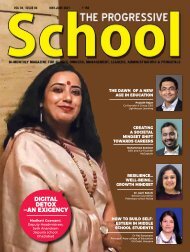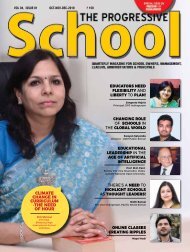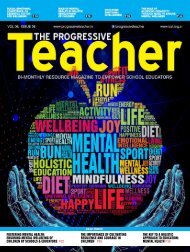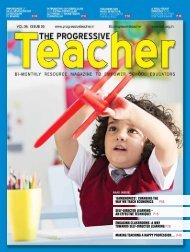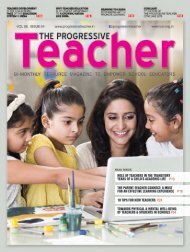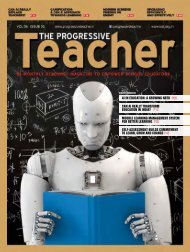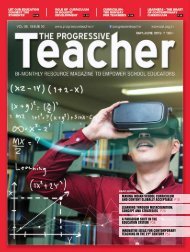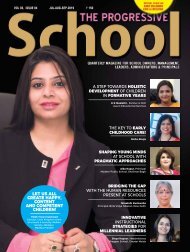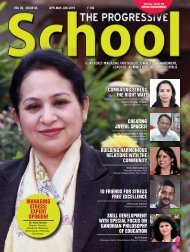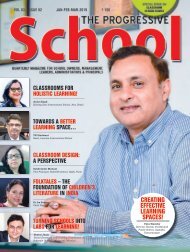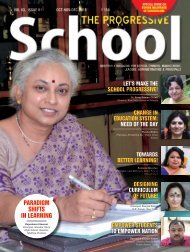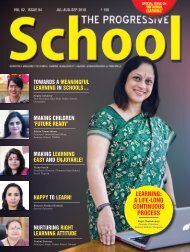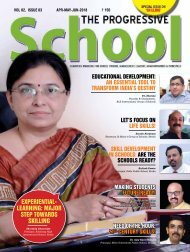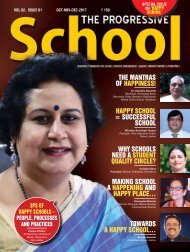The Progressive Teacher Vol 04 Issue 03
This issue of The Progressive Teacher focuses on "New Trends in Education ". In this edition, articles explore contemporary trends to enhance interactive learning amongst students.
This issue of The Progressive Teacher focuses on "New Trends in Education ". In this edition, articles explore contemporary trends to enhance interactive learning amongst students.
You also want an ePaper? Increase the reach of your titles
YUMPU automatically turns print PDFs into web optimized ePapers that Google loves.
learning<br />
Learned or Smart<br />
In trying to encourage students we<br />
sometimes hold up as iconic those who<br />
are smart and successful. And we should.<br />
My motto is that we must always celebrate<br />
success. But when encouraging, it’s often<br />
more important to encourage the process<br />
rather than only the outcome.<br />
–Steve Heisler<br />
Often those in possession<br />
of deep knowledge, or a<br />
well developed skill, look<br />
as though they were just born<br />
that way. Looking like a genius is<br />
part of the art. A skilled dancer<br />
or mathematician should look<br />
as though they accomplished<br />
with ease what was a complex<br />
series of skills practiced over<br />
and over and over again. For<br />
entertainment, brilliance puts on<br />
a great show. For teaching, the<br />
brilliance show alone does not<br />
always help.<br />
One struggling reader, perhaps<br />
echoing the perspective of<br />
many struggling readers, once<br />
identified good readers as having<br />
some kind of a ‘special reading<br />
gene.’ He went on to note that to<br />
be a good reader you either had<br />
this gene or you did not: he was<br />
quite certain he did not.<br />
Now I would be remiss if I did<br />
not note that there are some<br />
readers simply born to it, who<br />
internalize skills with greater<br />
ease. <strong>The</strong> rest of us get the<br />
slow, repetitive, sometimes<br />
demoralizingly lengthy process of<br />
learning a collection of literacy<br />
skills that eventually produces<br />
reading fluency.<br />
Merely pointing out to a<br />
struggling reader how well her<br />
classmate is reading does not<br />
help. However sharing how that<br />
classmate practiced recognizing<br />
site words in order to improve<br />
just might.<br />
<strong>The</strong> same is true with us, as<br />
teachers, especially as examples.<br />
Once, while encouraging my<br />
students to dive into the depths<br />
of a novel, I was told that of<br />
course I could see all that<br />
underlying stuff. ‘It’s easy for<br />
you. You’re smart!’<br />
While full disclosure of personal<br />
insecurity dictates I must sadly<br />
admit that I wanted then (and<br />
still want to) jump on every<br />
opportunity to be considered<br />
smart, I was also aware that<br />
my being ‘smart’ was not a very<br />
effective teaching tool. Instead<br />
I made a sincere effort to<br />
capture that teachable moment<br />
by showing that my supposed<br />
brilliance was derived not from<br />
my abundant intellectual gifts<br />
but rather an ordinary interest in<br />
literature and a desire to reread<br />
the book repeatedly and study<br />
critical texts to both deepen my<br />
personal understanding of that<br />
book and find interesting ways to<br />
teach it.<br />
In other words, folks, I wanted<br />
to teach this truth: that what<br />
appeared as smart was actually<br />
just learned. Recognizing<br />
process and rewarding progress,<br />
no matter how microscopic, is<br />
amazingly critical, especially<br />
when engaging still evolving<br />
students. <strong>The</strong> message has to be<br />
uniquely about process because<br />
in the end process is all they or<br />
we can control.<br />
Make sure your students and<br />
children know that smart without<br />
learning is not really all that<br />
smart. It’s learning that makes<br />
smart smart, and learned is what<br />
all of us can be.<br />
Steve Heisler is the author of <strong>The</strong><br />
Missing Link: Teaching and Learning<br />
Critical Success Skills. Steve is a<br />
speaker and professional development<br />
consultant with a focus on teaching<br />
and instructional development,<br />
building student success skills and<br />
parenting. He is an experienced<br />
teacher and school administrator<br />
having worked K-12 in schools in<br />
New York City and New Jersey. His blog and contact<br />
information are available at www.sheisler.com.<br />
Jul/Aug 2017<br />
www.progressiveteacher.in 61




